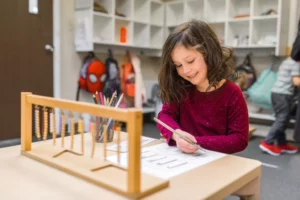Parents and teachers play an important role when it comes to teaching essential skills to kids. Teaching kindness to your kids is important. Kindness, like many other qualities, is something that children develop over time and through practice. Fortunately, there are numerous things you can do to encourage your child to be a gentler person.
Tips For Teaching Kindness To Your Kids:
The suggestions below will assist you in teaching your child to be kind and compassionate.
#1 Believe in your child’s ability to be kind.
Treating your child as if he’s always up to no good will be up to no good soon. However, if you assume he wants to help and cares about other people’s needs, he will tend to live up to those expectations.”
#2 Be a positive role model.
What you do and say matters; let your child witness you acting kind, such as driving an elderly neighbor to the store or offering a comforting word to a friend.

Most parents begin role-modeling their children from the beginning. Being a role model lays the foundation for a lifetime of give-and-take and openness with people.
#3 Always treat your child with respect
This can be as simple as informing your child that playtime is ending. That is a deplorable way to treat any human being. You could also mention successful conflict resolution in the real world. Mommy and Daddy don’t always agree, but we listen to each other and treat each other with respect instead of putting each other down; you could tell your child at home. Treating your little ones with respect is one of the best tips for raising a kind kid.
#4 Encourage your child to notice people’s facial expressions
This is the first step toward understanding another person’s point of view. When we can imagine how the world looks from someone else’s perspective, we are more likely to reach out to others in need.
#5 Remind your child that how they treat others is important to you
A child, for example, may find it amusing to see someone get splashed if a car drives by and hits a puddle. You may mention, “That lady is not amused by what happened. Take a look at her face. She appears depressed. Her clothes are now filthy and wet.
#6 Don’t let rudeness pass you by
You could say, “Wow, that cashier must have had a really bad day to be so rude to us at the supermarket. What are your thoughts?” This teaches your child that they do not have to be mean back if someone is mean to them.
#7 Acknowledge kindness
Make it a point to show your child you notice when they do something nice.

For example, if someone slows down to let you out of a parking lot at a busy intersection, say, “That driver was really nice to let me out.” Similarly, if your kid treats someone nicely, recognize and praise his/ her efforts.
#8 Understand that your child’s perception of differences in others plays a role
Young children notice differences in people, just as they do in animals and crayon colors, so they assume the best. If your child makes a socially inappropriate remark, it is critical to investigate the remark calmly. First, ask, “Why do you say that?” Then you can clear up any confusion by fully explaining the situation.
#9 Be aware of messages your child picks up from the media
Children are just as likely to imitate the kind of actions they see in movies and read about in books as they are to act out other types of scenarios. Be aware of the programs and movies your child watches and be available to discuss what they see.
Takeaway:
Kindness and compassion can be taught, and even adults face difficult situations in life. Being a good role model and a loving parent will go a long way toward raising a wonderful, tolerant human being. Raising kids is quite challenging. However, following the parenting tips could be helpful. Whether it is teaching kindness to kids or letting them know the importance of time management, following the tips can be helpful.










